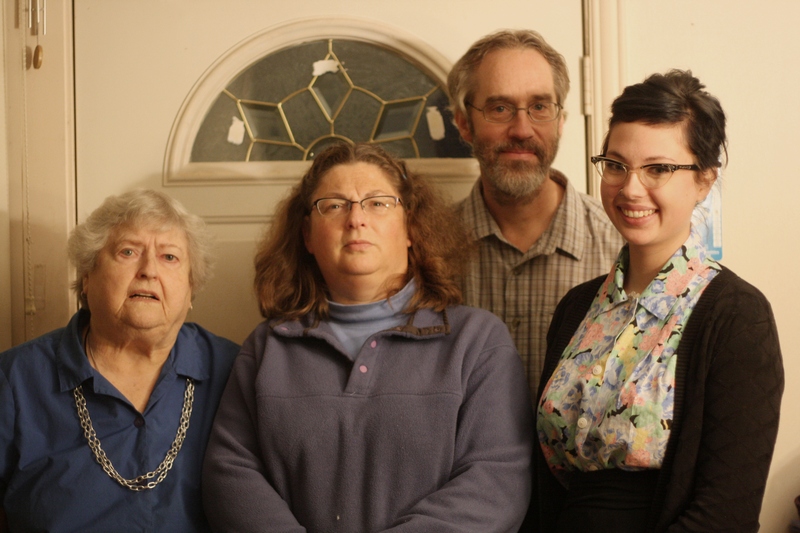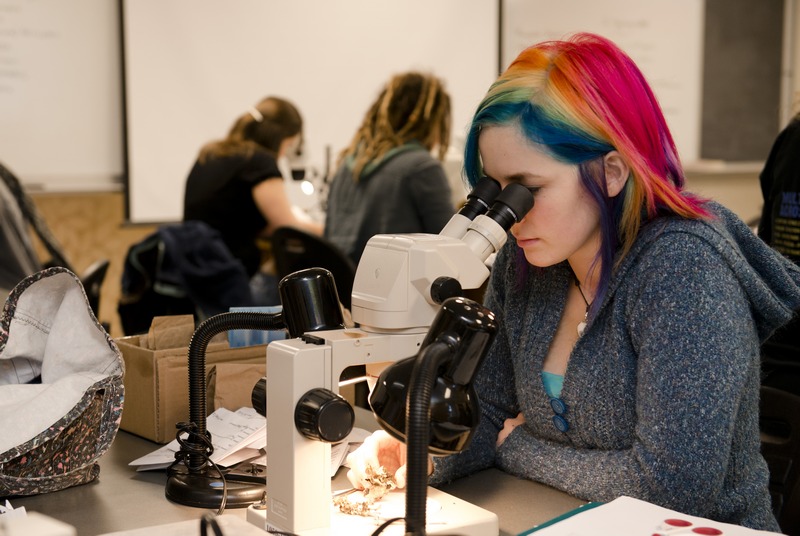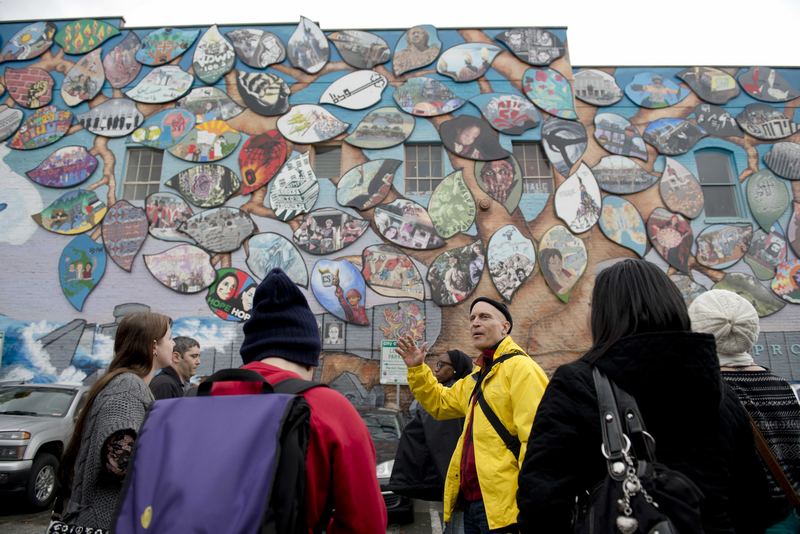Evergreen has a wonderful Youtube channel, populated with a variety of footage from across the community, including our own Ted Talks and artist lectures.

Evergreen has a wonderful Youtube channel, populated with a variety of footage from across the community, including our own Ted Talks and artist lectures.
Retired staff member Bonita Evans passed last month. She worked in Academics at Evergreen for 14 years until her retirement in 2000. Bonita initially served as a program secretary before working for 10 years to support both the Master of Public Administration and Master of Environmental Studies programs. Bonnie is described by a colleague as, “a clear light of honesty, hopefulness and mirth [who] always had a smile and a good word…” Additional information can be found at her online Obituary.
Alumni in the area should visit the Evergreen Library lobby before January 11, 2013 to see this display of students’ illuminated manuscripts from the program Religion, Society and Change.

Rebecca Chamberlain (right), students and selected images from her program Religion, Society and Change. In February, Rebecca will facilitate an Evergreen Traveling Seminar on storytelling for Greeners and friends in Los Angeles.
Illuminated manuscripts: the tactile relationship between word and image; the ways in which manuscripts mirror the self. We explore manuscripts through the lenses of interpretation, religion, art history; we draw upon manuscript traditions — Jewish, Muslim, and Christian, the ancient, medieval, modern. Continue reading
Editors note: We picked up this story when Midge Price ’84 sent us a lovely email speculating that her family was perhaps the first to have three generations of Greeners.

Three generations of Greeners in the Miller-Price family gather for a portrait–from left to right are Monty Miller ’76, Midge Price ’84, David Price ’83, and Nora Price ’16. “Luckily I have enough laundry to use as an excuse to take the bus home and eat dinner with everyone about once a week,” notes Nora, who just started her freshman year at Evergreen.
Monty Miller ’76, the matriarch of the Miller-Price family, graduated from high school in 1952. She started her college career in Germany, because her father, a military man stationed overseas, only agreed to pay her college tuition if Monty lived with him. Monty didn’t finish her degree immediately, she returned to the states, and a few years slipped by.
Editor’s Note: Current student, Sean Blomgren, wrote this piece about the use of drones in the US military. He is a student in Steve Niva’s program, Transforming the Art of War: From Industrial to Asymmetric Warfare, and Beyond, which recently hosted a campus forum, Drone Warfare: Home and Abroad exploring this issue.
Republicans who were outraged by November’s presidential election results have some unlikely intellectual bedfellows: Pakistanis. However the anger some Pakistanis feel comes from a much different place. It comes from their first-hand experience with drones or unmanned air vehicles (UAVs). “The same person [Barack Obama] who attacked my home has gotten re-elected,” said Mohammad Rehman Khan in a Reuters article about drone victims in Pakistan.

The task? Study and classify 40 different lichens and mushrooms for The Fungal Kingdom. Photo by Shauna Bittle
Editor’s Note: Recently, Vice President for Academic Affairs, Michael Zimmerman sent the following note to the campus community about the death of David Whitener. Last week Indian Country Today also honored David in an article.
Friends,
It is with sadness that I share with you the recent passing of David Whitener, Sr. David was a member of the faculty at Evergreen for 18 years, ending with his retirement and the conferring of Faculty Emeritus status in 1996.
Upon his retirement, David was described as a “mainstay” in the Native American Studies program dedicated to teaching methods that best support Native American learners. David was also a catalyst for the Longhouse House of Welcome and is considered one of its pillars.
Editor’s Note: Recently, Loren Petty of the Masters in Teaching program sent the following note to the MIT alumni about the death of Masoa Sugiyama.
The faculty and staff of the MiT program are sad to inform you that Masao Sugiyama passed away last night. He sustained significant brain injuries last week as a result of a fall. Throughout his time in the hospital, Masao was surrounded by family and friends who loved and supported him.
We will miss him dearly! We are deeply grateful for the compassion and support he always offered you, his students. He was your constant and vocal advocate, frequently telling us that you were the best teachers in the state. We will remember Masao for his deep commitment to equity, his humor, and his honesty.
The Mendoza-Sugiyama family thanks you for your loving thoughts at this time.Best wishes to all of you,
Loren E. Petty
Readers: Do you have fond memories of Masao? Share your thoughts by commenting and we will pass the comments on to Loren and Sherry for possible inclusion in the newsletter.

Member of the Faculty, Greg Mullins discusses the Olympia-Rafah Solidarity Mural with Evergreen students in downtown Olympia. Greg explores literature and human rights in his research and teaching. Photo taken by Shauna Bittle
Editor’s Note: We recently asked Greg Mullins, Member of the Faculty, to write a piece about his research into human rights and literature. He is the author of Colonial Affairs: Bowles, Burroughs, and Chester Write Tangier. Greg is currently working on a project called The Banality of Good: Cultures of Human Rights and teaching a program called Freedom Dreams: The Cultural Revolutions of the 1960’s.
Greg Mullins: When I first read John Milton’s Paradise Lost many years ago, I noted an irony much commented upon by literary scholars: as heroes go, Adam is anemic at best. Lucifer, the villain, has all the star power. In fact, many readers find him powerful and charismatic.
Ordinarily, wouldn’t we expect villains to be vile?
Over several years of teaching and writing about human rights and literature I’ve often thought about that irony. In a morality tale, the good guy wins and the narrative offers a moral lesson to the readers. But in a great deal of contemporary literature concerned with human rights violations, there is no simple moral to the story. Frequently, the text refuses closure, leaving the reader on her own to contemplate what to think upon finishing the book. Consider, for example, Coetzee, Waiting for the Barbarians, Ondaatje, Anil’s Ghost, or Danticat, The Dew Breaker.
Is it possible that reading literature concerned with human rights violations can nudge readers toward a better ethical and political understanding of why those violations happen, and what can be done to prevent them? I would argue that literature can serve that function. In fact, I argue that literature can provide a sort of antidote to the banalization of the language of human rights that we see all around us in political rallies, slogans, bumper stickers, fundraising appeals, and sound bites.
Not only does the act of reading literature force us to slow down and think, but the best of that literature challenges us to reevaluate what we think we know. A vile villain is easy to hate; a virtuous hero is easy to love. But why would we need to teach ourselves to think ethically if the world were as simple and unambiguous as a morality tale?
Readers: What’s your response to Greg’s questions? Can literature nudge us towards a better understanding of human rights violations?